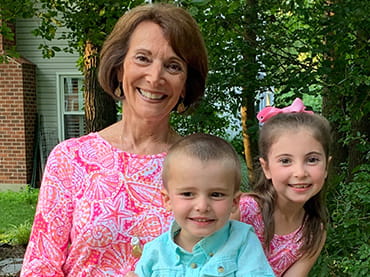The Challenge: Years of Illness and Seclusion
Karen was on her way to church in March 2012 when she fell down the steps of her Norfolk home. She landed headfirst into a wall.
Other than a sore neck, she felt okay. Two days later, Karen says she got “the worst headache of [her] life."
It was the start of a seven-year odyssey of illness, disability, and seclusion she thought would never end.
Karen, then 59, went to see her PCP.
Along with a severe headache, she was:
- Feeling nauseous and throwing up.
- Experiencing vertigo.
- Having vision problems.
“I also felt dazed and extremely drowsy," she adds.
Her PCP sent her for an MRI and, later, a CT scan. Although the tests came back negative, he suspected she had a concussion.
By the time Karen saw her PCP again a few weeks later, her drowsiness had resolved.
But now she had insomnia, combined with:
- Persistent migraines
- Nausea
- Vertigo
- Nighttime hallucinations
- Exercise intolerance
- Increased sensitivity to light, sound, and movement
- Mood swings, including bouts of uncontrollable crying
It was scary," says Karen.
Alarmed by her symptoms, Karen's PCP referred her to a neurologist who diagnosed her with post-concussion syndrome. He focused mainly on prescribing medicine for the migraines, telling her, “There's no magical treatment to speed the concussion recovery process."
"It was wonderful to regain my independence. What I value most is being able to play again with my grandchildren instead of laying in bed." — Karen
Though Karen kept having bouts of severe vertigo and nausea, it was another two years before her neurologist found something. He detected nystagmus — uncontrolled, repetitive eye movements — and referred her to a vestibular therapist.
Karen's Path to UPMC: A Second Concussion and Worsening Symptoms
Months of balance therapy addressed Karen's vertigo, trouble focusing, and keeping her balance. It helped ease her symptoms, but she still had sporadic vertigo and frequent migraines.
“I was better, but I knew deep down I wasn't totally healed," she says.
Then, in April 2017 — five years after her first concussion — Karen bumped heads with her young granddaughter.
She thought nothing of it until a few days later when she woke up feeling awful. She had a severe migraine, nausea, and vertigo that left her unable to stand.
Her relentless symptoms forced her to stop driving and retire from her job as a nursing teacher.
Karen ended up seeing two more neurologists.
A local doctor diagnosed her with chronic atypical vestibular migraines, ordered more balance therapy, and increased her medications.
Still not better, Karen sought another opinion from a highly regarded New York concussion expert. He said she had sustained a second concussion and told her to rest, meditate, and do yoga.
“Concussed brains require a lot of rest," he said.
“Out of desperation to reclaim my life, I followed his advice. But, over time, I felt worse and worse," says Karen. “My world became very small. I wondered if I would ever be well enough to work, travel, or, most importantly, enjoy my grandkids."
Karen started to spend more and more time at home.
“I couldn't stand, walk, or be in large crowds for more than 10 minutes before feeling nauseous and weak. I felt like I was going to pass out," she says.
The first sign of hope came during an internet search when she stumbled upon a blog written by a grateful Houston man. He had successful treatment at the UPMC Sports Medicine Concussion Program.
“That was the luckiest day of my life," says Karen. “I turned to my husband and announced, 'We're going to Pittsburgh!'"
The Solution: A Visit with Dr. Micky Collins at the UPMC Sports Medicine Concussion Program
A few weeks later, Karen was in Pittsburgh for a day of tests and assessments with Michael “Micky" Collins, PhD, program director.
During her first visit with Dr. Collins, he said that rest — as previously prescribed — was the exact opposite of what she needed.
“From day one, Dr. Collins assured me that concussions are treatable," says Karen. “His confidence inspired me. He and his team gave me hope — something I had been without for a very long time."
Under Dr. Collins' care, Karen began exertion, vestibular, and physical therapies tailored precisely to treat her concussion symptoms.
“It was life changing! UPMC's team of experts knew what I was experiencing, both physically and mentally. They fully 'got it,' unlike so many others," she adds.
Karen's daily “homework" included challenging exercises and conscious, repeated exposure to symptom-causing triggers such as:
- Ceiling fans
- Bright lights
- Loud restaurants
- Movie theaters
- Shopping
“Exposure to things I had avoided for so long was brutal, at first. It would take an hour to recover from my intense symptoms. Then I would “expose and recover" again — over and over," says Karen. “It was grueling, but my desire to more actively enjoy my three grandchildren motivated me to do exactly what the team prescribed."
The Results: Playing With Her Grandkids Again
Slowly, Karen began to see improvement.
Six weeks later, she came back to Pittsburgh for a follow-up appointment. The team prescribed even more exercises while sharing their confidence in a future full recovery.
Over the next year, Karen's world grew bigger as her symptoms improved and she ventured out more.
She was able to socialize, shop, and go out to dinner. By April 2019, she started driving again. She also resumed teaching and finished a 5K walk.
“It was wonderful to regain my independence," says Karen. “But, by far, what I value most is being able to play again with my grandchildren. I can take them to the park or a museum, instead of lying in bed."
“Thanks to Dr. Collins and his all-star team, my life is so much better now. It's scary to think where I'd be today if I hadn't found the UPMC Sports Medicine Concussion Program."



















